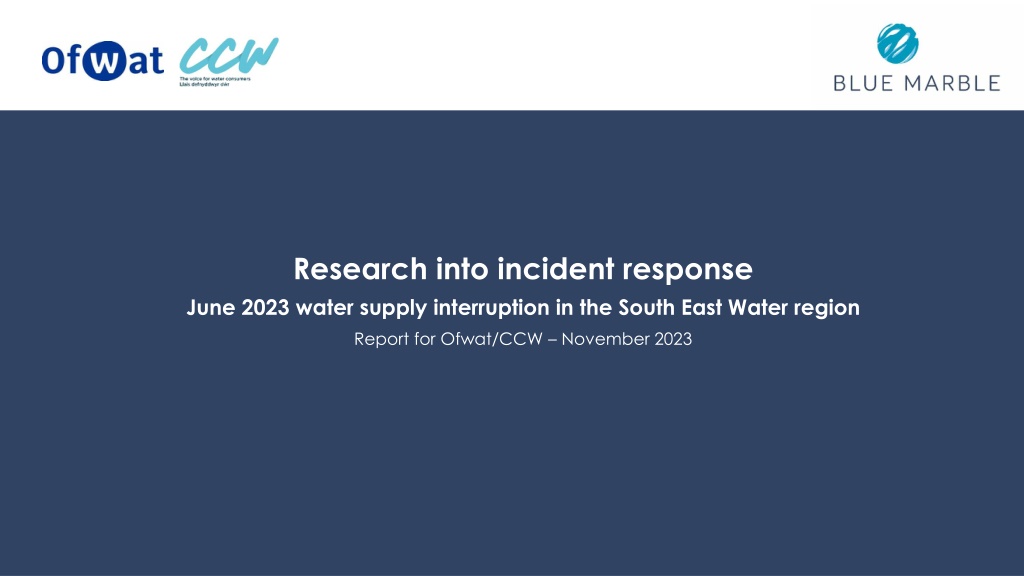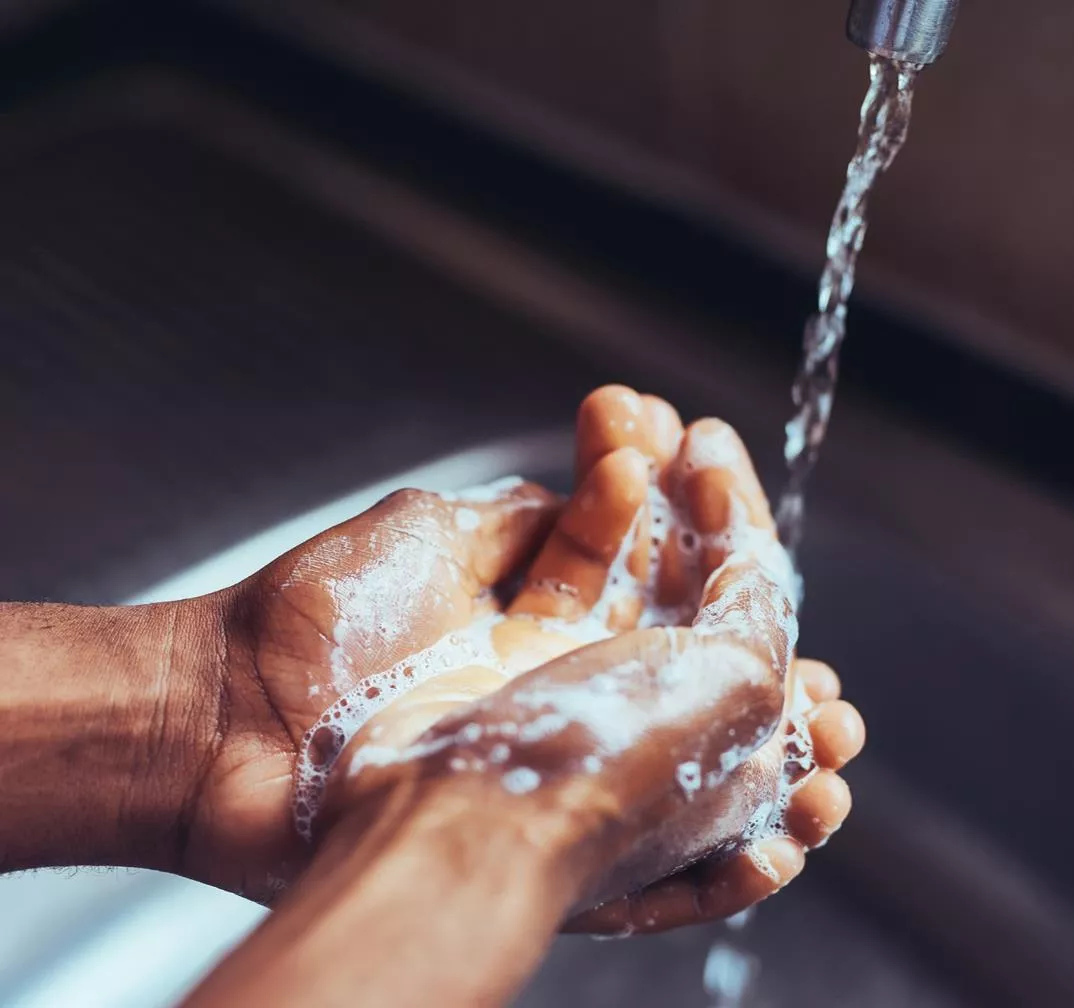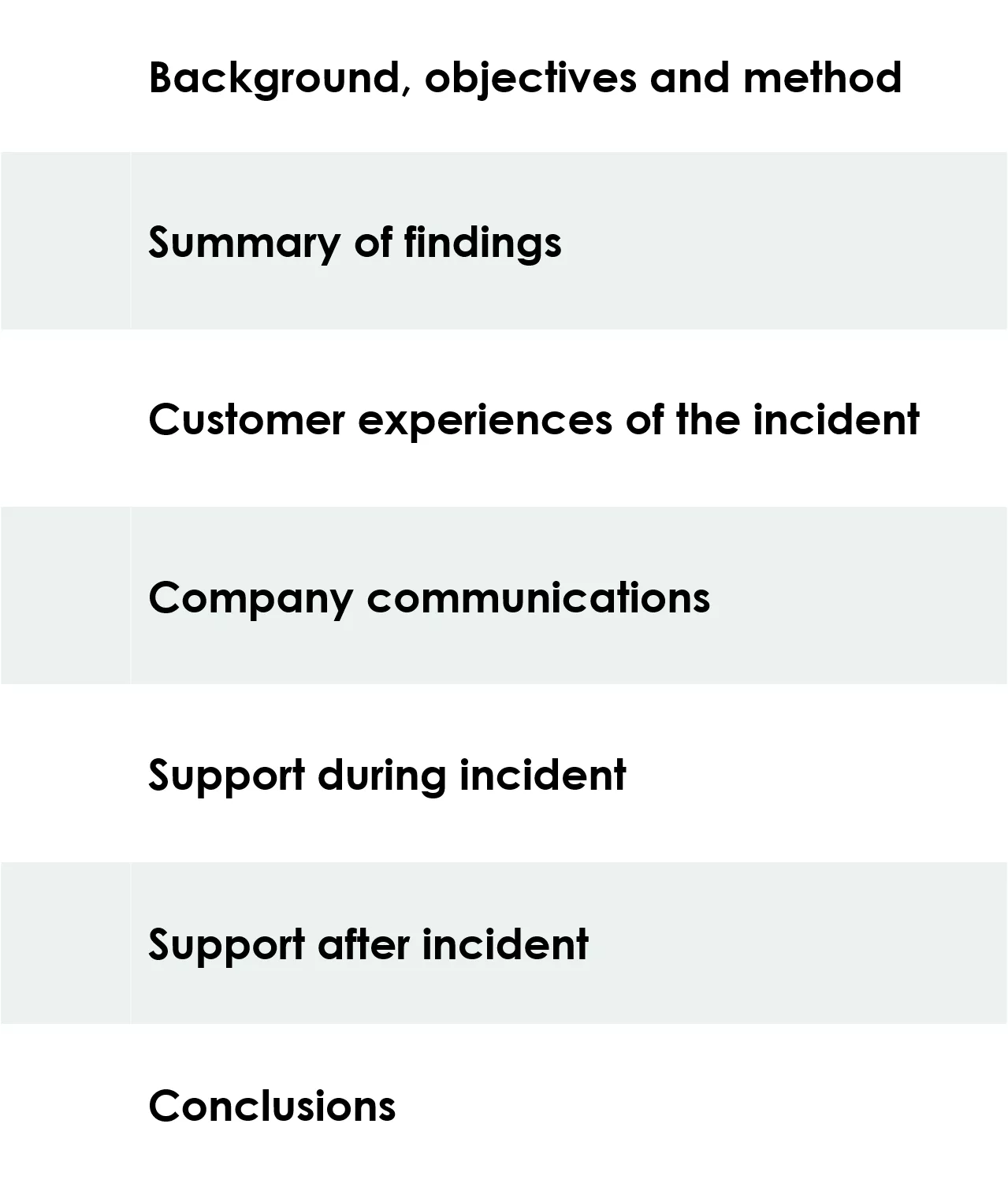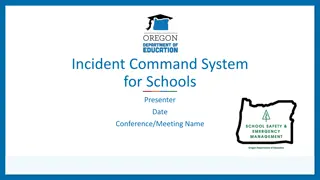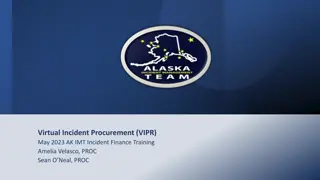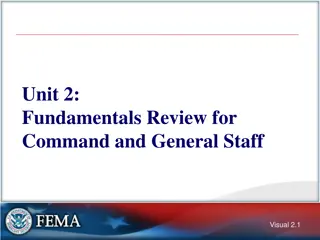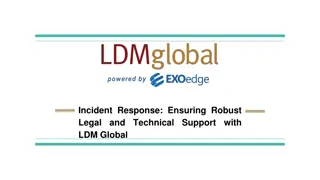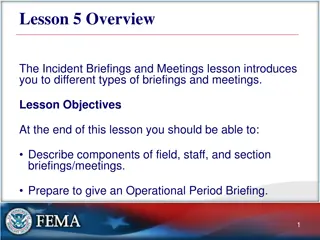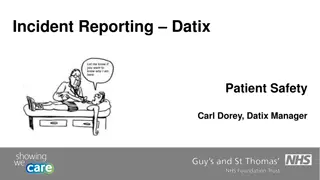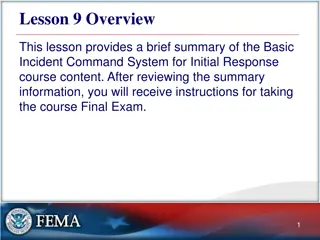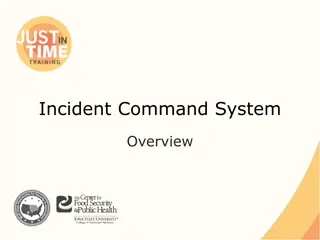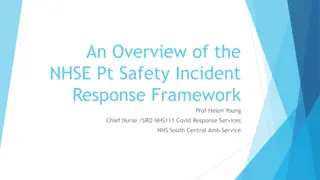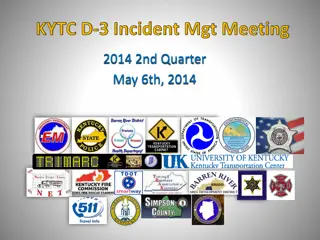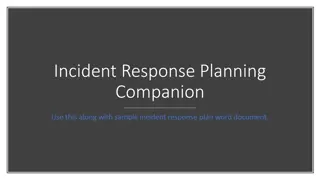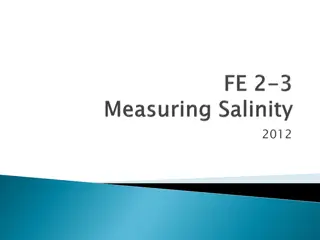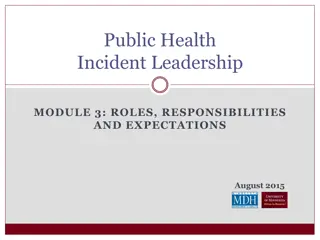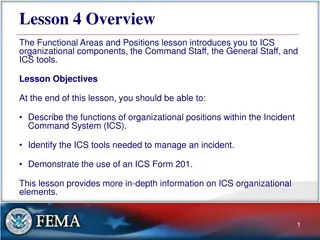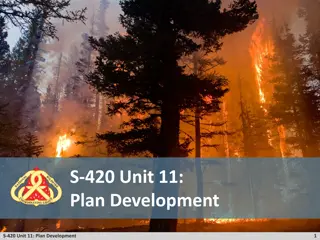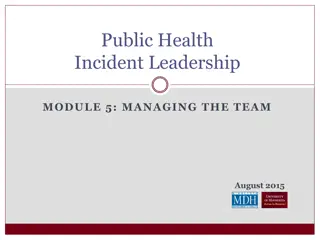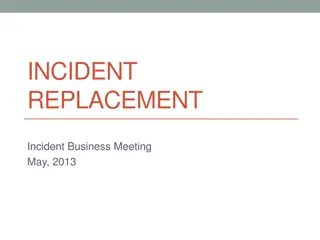Research into incident response
Blue Marble conducted research commissioned by Ofwat and CCW to understand customer experiences during the June 2023 water supply interruption in the South East Water region. The report aims to identify customer expectations, company responses, communication effectiveness, support provided, and areas for improvement. The incident affected thousands of residents with issues ranging from no water to low pressure, lasting from hours to days. The research program seeks to enhance incident management and regulatory practices for better customer outcomes.
Download Presentation

Please find below an Image/Link to download the presentation.
The content on the website is provided AS IS for your information and personal use only. It may not be sold, licensed, or shared on other websites without obtaining consent from the author. Download presentation by click this link. If you encounter any issues during the download, it is possible that the publisher has removed the file from their server.
E N D
Presentation Transcript
Research into incident response June 2023 water supply interruption in the South East Water region Report for Ofwat/CCW November 2023
Contents Contents 2 2 Background, objectives and method 1 Summary of findings 2 Customer experiences of the incident 3 4 Company communications 5 Support during incident 6 Support after incident 7 Conclusions Photo by Jacek Dylag on Unsplash
Background, objectives and method
Context of wider research programme 4 4 Blue Marble was commissioned by Ofwat and CCW to conduct research with household customers to understand their experiences when incidents take place. The research is primarily focused on water or wastewater-related incidents that affect people in their homes or gardens, or going about their daily lives. The programme will generate findings which: Help to better establish what customers expectations of companies are when incidents occur and how well these expectations are met 1 Can be used by Ofwat and CCW to improve companies responses and management of incidents and people's experiences when incidents take place 2 Support Ofwat s wider regulatory work and inform CCW s wider work on behalf of consumers 3 This report is the first within that programme of work. More information on the project is available at: https://www.ofwat.gov.uk/customer-insights-when-things-go-wrong/.
Objectives for this project 5 5 The overarching goal of this long-term research programme is to better establish what customers expectations of companies are when incidents occur and how well these are met. The objectives for this specific project (the first in the programme) are as follows: Understand the views, experiences and expectations of affected South East Water household customers following the June 2023 supply interruption incident, including views on South East Water s speed of response, support, communication, compensation and overall resolution 1 Determine any differences in the expectations and experiences of different customer groups affected by the incident 2 Identify what parts of South East Water s response to the June 2023 incident worked well and what could be improved 3
Introduction to the incident we explored 6 6 Ofwat and CCW received complaints directly from South East Water customers about supply issues they experienced in mid-June 2023. Ofwat and CCW chose to focus on these issues as the first part of the new research programme on incident response. The incident explored: In mid-June 2023, thousands of residents in the South East of England experienced supply issues including no water, intermittent supply or low pressure Some residents experienced issues for a number of hours, for others it lasted for days, even up to a week There has been significant media attention on the impact of the interruption, focusing on issues such as schools and businesses that had to shut, care homes sending residents in vulnerable circumstances to stay with relatives, and reports of animals in danger of death by dehydration The outage was due to hot weather and high levels of demand. In response to the increased levels of demand, South East Water subsequently announced a hosepipe ban for Sussex and Kent which came into effect from June 26th and was lifted on the 4th of August Please see the appendix for a timeline of the incident based on information that was shared with regulators at the time of the incident.
Method overview 7 7 We conducted qualitative research with 43 household customers from affected areas within the South East Water region, to understand customers experiences first-hand. Fieldwork was conducted online and via telephone. 5 x 90-minute focus groups Customers were purposely recruited to include a range of experiences and perspectives on the incident: Financially vulnerable, child-free households Financially stable, child-free households Length of disruption from 12 hours up to 1 week Households with children under 7 years Households with dependent children 7+ years Extent of disruption all were affected at their own home, with some also affected at work, at children s schools/nurseries or at the home of someone they care for Households in vulnerable circumstances Priority Services Register* (PSR) status including some who reported being on the Priority Services Register 12 x 1-hr depth interviews Access to transport we recruited some customers who did not have access to a car 5 complainants 3 digitally excluded customers 4 customers in vulnerable circumstances Billing status including some who were not billed directly (e.g. water supply is in landlord s name) Pre-task: All participants asked to complete a short pre-task, which included 3 questions about their experiences of the incident. For further information on the sample, please see the appendix. Participants were given the option to respond to this via video message, online survey or assisted telephone call. *Priority Services Register is a scheme which provides enhanced services to those who might need extra support, such as braille bills, or increased warning ahead of planned works. (https://www.southeastwater.co.uk/help/priority-services/)
Key findings 9 9 Almost all participants were disappointed by South East Water s management of the June incident they said the company had not learnt from previous incidents. Participants believed that the handling of the incident made the experience worse for residents. This led to feelings of frustration and, in some cases, anger, and a loss of trust in the company. 1 Participants reported the company's communication with them was poor. They wanted the company to be more proactive in telling them about the supply problems, and more open and honest in the information they did provide (for example, restoration timeframes). Better and more accurate information would have helped them plan and manage during the incident. Participants were frustrated and this was exacerbated by the tone of some of the communications. 2 Most participants did not feel supported by South East Water throughout the incident they did not feel the alternative water provided was sufficient to meet their needs. Water stations were viewed as being not well publicised, hard to access and chaotic. Water deliveries felt sporadic and unpredictable, and therefore not as helpful as they could have been. 3 Vulnerable customers, including those who reported being on the Priority Services Register, had mixed experiences of the incident. Some received water deliveries from the company, while others, who believed they had registered for extra help, did not get water delivered. Very few participants were contacted by the company directly with an offer of support. 4 At the time of the fieldwork (July August 2023), very few participants reported hearing from South East Water since the incident. Only a few had received compensation, and numerous participants had been told by the company that they were not entitled to compensation. 5
Customer experiences of the incident
Water supply problems in mid-June had a significant physical and mental impact on participants 11 11 Types of issues experienced: During recruitment we made sure that we had a spread of different types of interruption experience within the sample Some participants had very low pressure for extended periods, intermingled with periods of no water (or restoration of supply for very short periods). Some were without water for short periods of time, but repeatedly In the most extreme cases, participants were without water for extended periods (up to six days) Beryl, health vulnerable (autoimmune disease), not on PSR as unaware of the service: Beryl s water supply was intermittent for seven days. She had to get water from the school where she works, and shower at the gym as well as not flushing the toilet. Beryl has an autoimmune disease that means she needs to drink a lot of water to hydrate and keep her mouth moist. On the first night of the interruption it was too late for her to buy water, so she had to drink cola instead. Beryl had no texts or communication with South East Water. I felt that I was a bit in the dark at times. Furthermore, she didn t know about the PSR. Whilst she didn t expect to receive any support during the interruption, she told us that she would have benefitted from a delivery of water. [The Priority Services Register] would have helped me in terms of being able to medicate and use water when I needed water, that sort of thing. There were numerous impacts on customers lives, and those in vulnerable circumstances experienced the impact more severely Mental impact: Uncertainty about interruption length Concern about staying healthy/ hygienic Mental burden of resolving issues (e.g. locating alternative water) Physical impact: During an interruption, it takes time and energy to: Stay hydrated Stay hygienic, e.g. being able to flush the loo, shower Cook Keep up with laundry
Everyone found it hard to cope with participants in vulnerable circumstances finding it particularly difficult 12 12 Examples of participants typical coping mechanisms during the supply interruption Using water/facilities at alternative locations: Staying with a friend Staying at a hotel Eating out to avoid washing up Showering at the gym Alternative toileting (forest/dog bags in extreme cases) Finding alternative water supplies: Buying water at a supermarket Collecting water from an unaffected friend/relative Getting water delivered Going to a water station Changing routines around hygiene: Waterless washing and cleaning (baby wipes, hand sanitiser) Cleaning self/clothes/house less often than usual Avoiding washing clothes, using laundry services, or taking washing round to friends and families houses Simple tasks that you don t really think about become quite a challenge something that you have to organise. Complainant, 5-day interruption For participants in vulnerable circumstances, it was harder to access these typical coping mechanisms Routines around hygiene and hydration were particularly important for some participants in vulnerable circumstances: Staying hydrated key for elderly, pregnant, certain health issues Staying hygienic a top priority in households with young children, incontinence, the immunocompromised Some found it harder to find alternative water: Expensive Requires mobility or transport (the latter also has a cost attached) Requires social links with friends or relatives unaffected by the interruption
Frequent supply interruptions in this area meant customers were more frustrated 13 13 Case study: Wadhurst a community worried by the possibility of future interruptions: Some participants in Wadhurst mentioned a public meeting in July where they were told there was no guarantee that a similar interruption wouldn t happen again While pleased at the presence of the company CEO, they were incensed that nothing was being done to prevent interruptions recurring In the affected region, participants expected problems with their water supply as a matter of course. Interruptions had been a recurring issue over the last few years and are rarely a one-off almost all respondents were aware of this from media coverage/experiences of people they know Many respondents had also experienced multiple issues themselves (with the Freeze-Thaw event in December being most common) there was low confidence that mid-June interruptions will be the last ones experienced Participants experiences of individual incidents (like the recent June issues) were subsequently viewed through a lens of deeper frustration. Each new interruption was interpreted as evidence that South East Water was not doing enough to address the issue. Participants sympathy was low as interruptions felt less like a one off The senior people at South East Water don t want to talk to us. Complainant, 5-day interruption Some participants felt compelled to take the issue over the heads of South East Water to see changes in how supply interruptions are being dealt with. For example, by writing/signing petitions, speaking to media outlets/local MP/parish council/CCW/Ofwat, making official complaints I think it will happen again .since this incident, I'm not confident in them. Dependents aged 0-7, 7 day interruption
Dissatisfaction with how the incident was managed led to feelings of frustration, anger and lack of trust 14 14 When asked to name one thing that South East Water did well during the incident, some participants struggled when thinking of an answer and others reported nothing . Almost all participants expressed a complete lack of confidence in South East Water when asked how effectively they think South East Water will handle future incidents. When asked to rank how well South East Water handled the interruption on a scale from 0 to 10, almost all participants gave a score of 4 or less. Participant scores consistently showed that people did not believe South East Water had handled the interruption well. In general, the longer the interruption, the lower the score. A few had weak positive feelings towards: The fact that the interruption ended (especially for those experiencing short interruptions) Direct interactions with frontline members of South East Water s staff. In a small number of cases, those who had such interactions reported their customer service staff provided positive experiences amidst a difficult situation (although many also reported logistical problems with the provision of water stations) Compensation (for those that received it) Most were frustrated with the communication and support provided this has not improved between incidents (for those who experienced multiple) A few were slightly optimistic about this research project they want to make sure that South East Water learns from its mistakes Disappointed participants said that drastic change is needed to make South East Water fit for purpose, e.g. replacing the management team, stronger regulation I'm going to have to give them a 0, because they did nothing. Complainant, 5-day interruption
Case study: extended interruption and personal circumstance limiting ability to cope 15 15 Linda* is 63, retired, and lives in a village with her husband. She was without water supply for a week, but left to travel to a second home after four days, as she felt unable to cope. SEVERITY:VERY HIGH The respondent felt completely unable to cope and subsequently left the house. Linda received 250. This was taken off arrears she already had due to incorrect metering, and so didn t feel like real compensation . The email communicating this stated that the interruption was due to hot weather , a fact she contests. Linda wants to cancel her direct debit, and only pay her bill when she receives water. Texts and emails that Linda received from South East Water lacked information about support available, and the timeline on the daily texts she received was pushed back by 24 hours each day. Linda also told us that residents were speculating about the cause of the interruption on social media due to a lack of information. The interruption (Linda s third since 2020) began a few days after her mother s funeral she felt too overwhelmed to look at the website for more information and so was reliant on direct communication from the company. Linda coped by buying bottled water (with a water station only set up 2-3 days into the interruption) and going to the toilet in the garden/using dog bags, as she felt it was more hygienic than being unable to flush the toilet. She found the situation increasingly stressful, and so left the property. A lot of people were just speculating, some saying, I ve just seen a massive water leak I m guessing it s that, we had all sorts of people making suppositions about what might be going on, but we couldn t find out what was actually going on. I couldn t cope, which was why after four days, I think it was, I said I can t stand this, it s really making me feel ill, the stress of it all, so we just went. The anger and the outrage are beyond belief, quite rightly so. *Names have been changed.
Participants reported that direct communication was sporadic, lacking key information which would have helped them to cope with the interruption 17 17 Email/text Text and email communications were seen as sporadic, even amongst those who were certain they had signed up for them Most were initially unaware at the start of the incident of the opportunity to sign up for instant alerts they would have appreciated clearer signposting Some households on PSR received notifications, however this was not consistent The content of messages and emails wasn t seen as adding value being limited to repeated spam like messages that the water is off The tone was felt to be unsympathetic or robotic messages were not personalised to individual circumstance Some texts/emails lacked resolution timelines which were seen as key in coping effectively with the interruption Others had timelines that were pushed back by 24 hours each day this was a frustrating, repetitive let down , and prevented effective coping mechanisms e.g. deciding whether to stay with friends It was just a robot text, it meant nothing. Complainant in vulnerable circumstances (elderly), 5-day interruption There was one which said use water sparingly . A number of people got that one throughout the week, which was like a kick in the teeth. Complainant, 5-day interruption An email from South East Water s CEO announcing the hosepipe ban left a memorable negative impression Being asked to use less water when supply was interrupted was felt to be insensitive and irritating A few noted that South East Water apologised for the interruption For most, this apology was overshadowed/forgotten in light of a perceived shifting of blame for the interruption onto customers (through explanations around increased working from home)
Many proactively sought information from South East Waters online resources, but found these unhelpful 18 18 Website Participants using the website found an interactive map showing the service status in their local area, and that they could register to receive automatic updates via text or email. However, many reported that updates were not consistent, and most information on the website was updated more slowly than information from local councils on social media For some, the automatic alerts were the only communication they received from the company Participants also reported that the content of the website lacked meaningful information, such as the cause of the incident and when their supply will be restored. Emergency assistance information for those who may have needed specific help was also hard to find on the website. Social media accounts The company s social media accounts were frequently mentioned by participants as a resource to learn more about the situation due to the lack of support from other channels. Customers felt angry that the tone of voice of South East Water s twitter posts seemed to be inflammatory, and they did not find much helpful or clear information Many others did not follow the company on Twitter or Facebook
The experience of speaking to a member of frontline staff was mainly positive though didnt always help the customer 19 19 South East Water s telephone helplines The small number of participants who decided to give them a call directly reported largely positive interactions. There were mixed experiences of how easy it was to talk to staff some got through surprisingly quickly while others found it hard, having been put on hold for long periods of time The frontline staff answering the call were said to be lovely , being very apologetic and understanding of their experiences Some participants, especially the elderly, would have welcomed more direct interaction, such as door-to-door contact/leaflets Despite this, the conversations were not always fruitful, as sometimes the staff were not able to provide further useful information on the situation. In a few extreme cases, the operator was not aware of the interruption in their area Investigations and support promised over telephone were not followed up customers waited and tried to follow up, but some never received a callback which left them feeling deeply frustrated I think they did answer it straight away, took all my details and the person I spoke to was very pleasant. Complainant, 7-day interruption I was waiting on the phone for ages just to get through to someone. Customer in vulnerable circumstances (mobility problems)
Informal networks were participants primary sources of information about the interruption but were not the preferred option 20 20 Informal networks In light of the perceived shortage of direct and indirect information from South East Water about the interruption, most participants said their primary sources of information were informal networks. Community groups on Facebook or WhatsApp Parish bulletins Word of mouth in local communities What does this mean for participants experiences? Affected customers would prefer to have been contacted by South East Water directly, rather than relying so much on these informal networks. However, participants were relatively satisfied that informal networks filled what they saw as gaps in communication about the incident by giving them: More information generally More frequent updates e.g. detailing water station locations and timings Immediate responses to questions e.g. in comments sections Since the information provided came from second-hand sources, however, participants had doubts about how accurate or up-to-date it was. A few participants also suggested that community discussions about the incident could exacerbate anxiety levels with the discussion of inaccurate/out of date information worsening this process. Social media provides more reliable info and updates faster. Child free, financially stable Group Itdoesn t take much to put people into a lot of anxiety. Customer in financially vulnerable circumstances, 4- day interruption
Participants were disappointed by South East Waters communication during the incident - they wanted specific, tangible information at each stage 21 21 The Problem How to Cope Post-resolution When the problem first arose: Throughout the incident: Once the problem is resolved: The cause of the problem and who, if anyone, is to blame (could be due to uncontrollable circumstances or human error) The severity (helps determine appropriate level of concern about it) Resolution: What action is being taken to fix the problem Time scale for resolution What the expected frequency of updates will be (especially important during longer interruptions) The appropriate actions, if any, to help cope with the incident Availability of support: What entitled to Where to access support How to access support Who those with additional needs should contact Where to access any additional information (from South East Water/parish council/others) Who to contact if still experiencing problems What action is being taken to prevent the incident from happening again Whether customer experiences will improve if the problem recurs Entitlement to compensation: The form compensation will take The amount of compensation What aspects of customer experience compensation covers Reasons for compensation (in)eligibility Where to make a complaint if needs have not been met
Case study: extended incident and company comms limiting ability to cope 22 22 Dave* is semi-retired and lives with his wife. He experienced one day of low pressure followed by five days without supply in mid-June and contacted Ofwat to share his experiences, in the hope that customer service during future interruptions will be improved. SEVERITY:HIGH The significant impact of the interruption has been exacerbated by inconsistent/contradictory communications from his water company. Dave initially was told via text that the interruption was caused by an issue with a local pumping station, then received an email asking residents to reduce their usage (which seemed insensitive since he had no water). He also received no timeline for the resolution of the incident until the day before supply was restored which he felt made it harder to plan ahead and cope. After attending a public meeting, Dave is convinced there will be another interruption (this is his second). He has been informed via email that he will receive 250 compensation this eases the pain somewhat. He wants urgent action to reduce the risk of interruptions in his area. Dave found out about the interruption through direct experience. When he rang South East Water to ask about the problem, the operator wasn t aware about issues in his area and told him that the nearest water station was six miles away. Dave initially bought enough water for 24 hours (he assumed the interruption would last this long). When water stations were set up nearby, he got second-hand information about opening times from the parish council which proved to be inaccurate. I phoned their call centre [after the interruption began[ and the chap said no no everything's fine they simply hadn t told anyone in their call centres or updated their website to reflect that there was an issue ongoing. It's now 6 weeks later, I've still got those empty bottles in my garage, because the supply is so low that I think we might need them again, and go scurrying off to find water from somewhere else. It is disappointing that [the incident] took so long [to resolve], and we had no day-to day indication about what was going to happen. *Names have been changed.
Case study: extended incident and caring for livestock 23 23 SEVERITY:HIGH Louise* lives in a rural area with her husband and two school-age children. They own livestock such as horses and chickens. She experienced seven days without water during the incident. She complained to Ofwat about the outage, after experiencing difficulties communicating with South East Water directly. The impact of the incident was heightened by the difficulties of trying to take care of her livestock during the outage. In addition, her son was unwell, and her husband was away, leaving Louise to deal with the incident by herself. Louise didn t hear anything from South East Water directly, but did receive the instant alerts. When she first called South East Water, the phone was answered immediately, and the responder was pleasant and took her details. However, after contacting South East Water s Livestock Group to ask them to fill up her horses water troughs, she never heard back. Louise requested compensation, but at the time of research fieldwork her account said that her request was still being considered. Louise found out about the interruption from turning on her tap and noticing that the water pressure was low. She then read about the outage on community Facebook groups. Louise drove to the water station after hearing about it from Facebook. However, they only gave her 12 bottles, even though she asked for more for the horses. So, she chose to buy water instead of using the water stations. Most of the comms that I received really was through other people just talking within the community, within Facebook rather than anything directly or helpful from South East Water. I don't think I ever actually got a follow up as to whether compensation had actually been decided. I would rather they were just honest and explained the situation rather than trying to blame me." *Names have been changed.
Case study: digitally excluded and on PSR, limited comms from company 24 24 SEVERITY:HIGH Joseph found the first few days of the incident hard, and on day three moved in temporarily with his mother to try and make his daughter more comfortable. Joseph* lives with his partner and his 5-year-old daughter. He experienced two days without water, followed by an additional five days of low pressure. Joseph received a letter from South East Water a couple of days after the incident began, saying that bottled water would be available in a location 4-5 miles away. However, this location was not given precisely. He received no further communication from South East Water other than this, even though he was expecting a text or a phone call. Joseph had a 30 payment deducted from his bill. He feels this is fair considering the amount of people South East Water will be paying out compensation to. Joseph first became aware of the incident when he experienced low water pressure from his taps. When the next day he had no water, he asked his neighbours and realised that they were experiencing the same thing. Joseph stocked up on water from his local supermarket, as he thought the water station was too far to get to and he wasn t given its precise location. "We need something solid, in the next days, weeks, what they are going to do. Some assurance that the situation is being handled well. "They looked like excuses to me, high demand for water, people working from home it wasn't very helpful and not very useful information to me. For me it's basically the same information put on [the website]. There's no reason to go on there." *Names have been changed.
Participants identified a range of issues in relation to water stations, including poor communication, set up, and amount of water available 26 26 Support for all customers: water stations Communication: Communication about stations (such as when and where to access them) was seen as sporadic and sometimes inaccurate often through second hand sources The amount of water that was supplied by South East Water via bottles was insufficient because they gave us the statutory minimum that doesn t even flush a loo. Child free, financially stable Group Organisation: Stations often felt disorganised or chaotic water was not always available (especially at unstaffed stations), or queues were sometimes long (up to 40 minutes) Staff: In the early stages of the incident, stations often seemed unmanned. This led to water running out quickly; some participants reported that people were filling whole vans with water or collecting on behalf of businesses, sometimes taking hundreds of bottles of a time Some participants had positive experiences with frontline staff. They were unsure if these were from South East Water or the local council It was far too hit and miss really in the circumstances. Complainant, 5-day interruption Amount of water provided: Provision of water was often limited. Customers were grateful as this reduced stockpiling, but when informed about legal minimums felt the amount provided was lower than this. The statutory daily minimum (10L) was not considered enough for those experiencing extended interruptions as it is much less than typical daily usage Given difficulties with/lack of awareness of water stations, some sourced water from supermarkets. This was especially popular for households with small children, who were using bottled water as a primary way of coping (quicker, easier, can buy as much as you need). We saw some concerns about shortages and stockpiling from supermarkets.
Many PSR participants felt more supported by informal networks than by South East Water and thought poorly of the company as a result 27 27 Support for customers in vulnerable circumstances: overview Participants who felt they needed extra help raised difficulties signing up for the PSR (to provide enhanced support during an incident), despite believing they were eligible. Two participants with children under 5 called South East Water and asked to be added to the PSR after the freeze-thaw incident in December. Both told they were not eligible: one told this was because no residents with disabilities in her household Participants with young children appeared relatively unlikely to be aware of the PSR and wished they had been able to access enhanced support A few knew of elderly customers who were not on the PSR as unaware/incapable of ringing one participant in an area with a 6-day interruption even mentioned a door-to-door scam offering PSR sign-up to the elderly Participants on the PSR did not generally know what support they were entitled to during an interruption. They were unsure how many (if any) deliveries and how much water to expect Some were angered by the lack of support, others assumed none was available Informal support networks stepped in to support those in vulnerable circumstances in light of a perceived lack of support from South East Water. This included checking in on and providing water for neighbours/friends The parish council also went door to door identifying vulnerable households not on the PSR and passing their details to South East Water one participant felt the company could have engaged with the parish council more proactively If there's priority [services] like that, then I suppose it would help me... in terms of being able to control my own medical elements and being able to medicate and use water when I needed water, that sort of thing. Customer in financially vulnerable circumstances, 7-day interruption You would think you know, if you're a priority, that you would be contacted but no nothing. Customer in vulnerable circumstances (mobility problems) The parish council were brilliant, they had the backs of the village. They were on the phone to South East Water, they were identifying people who were vulnerable. Complainant, 7-day interruption
Many participants in vulnerable circumstances did not receive water deliveries and those that did found these disappointing 28 28 Support for customers in vulnerable circumstances: water stations Some participants eligible for the PSR (including both registered/unregistered) found it difficult to access water stations and would have preferred deliveries. Some had limited mobility (e.g. joint problems, wheelchair users, pregnant customers) and struggled to leave the house to go to a water station Others had limited time to go to the water station (e.g. those with young children) Support for customers in vulnerable circumstances: water deliveries Some PSR participants expected water to be delivered, and were surprised when it was not. Some participants appear to have received deliveries (or been offered them), but one PSR participant was only offered a water delivery after speaking to South East Water over the phone Others reported no contact at all (only 1/7 participants in the vulnerable circumstances group received a delivery) Where deliveries did occur, these felt sporadic, insufficient and poorly communicated. PSR customers often didn t know if deliveries would arrive, when to expect them, or how frequent they would be Delivered water often had to be supplemented from additional sources as it was not considered enough A few non PSR customers received deliveries, but as they weren t expected, their efficacy was reduced as alternative water had already been sourced I didn t hear of any water deliveries. Customer in financially vulnerable circumstances, 7-day interruption
Feeling unsupported during the interruption, participants suggest improvements in three key areas 29 29 Communication Water stations Support for PSR customers Signposting customers to practical information, such as: Water stations which are: Support which is: Widely advertised, particularly during an incident with clear communication about what it is, and the support that customers are entitled to during an incident Proactive including outbound calls/visits to check on PSR customers and inform them of the support available Includes deliveries as standard, triggered automatically when an interruption begins Financial where necessary compensating customers in vulnerable circumstances for water if they have to buy it Set up as quickly as possible As conveniently located as possible Staffed Accurately and directly communicated to customers (locations and opening hours) with up-to-date information about supplies, to prevent wasted journeys to stations that have run out Providing the statutory minimum of water per person more if possible Where necessary, restricting the amount of water per customer to prevent stockpiling but restrictions should be proportionate to household size and customer circumstances The location of public toilets with working water supply Lists of local organisations with working water supply offering assistance, such as free showers Where to access medical help customers expect local health services to have been notified and for emergency care to be available when needed How to request support from South East Water (key for customers in vulnerable circumstances and digitally excluded customers)
Case study: young children in household and participant informed they were ineligible for PSR 30 30 Clare* is a single mother with a one-year-old son, and experienced three days without supply in mid-June. This is her second interruption experience she was also without water for a week in December and temporarily moved into a hotel (with her newborn son). SEVERITY: VERY HIGH Perceived lack of communications and support from water company exacerbated anxiety levels (including worry about financial impact if no compensation arrives). Clare hasn t received compensation she feels it s unfair to pay for a service she didn t receive. She received 70 previously for the December interruption, which she says didn t cover her hotel expenses ( 500). She expects further interruptions in the future. Clare was not aware of receiving any communication or water deliveries from South East Water. When she rang up to enquire about timelines for resolution, and any support available, she felt that she wasn t a priority (and wasn t informed about the Priority Services Register). Clare was surprised by how many aspects of her life she relies on water for she couldn t make her son a bottle, wash her hands, flush the toilet, cook or keep the house clean. She says that being unable to do these things or resolve the interruption made her feel powerless. Clare s local shop had run out of water, but fortunately she had 4L left over from a previous interruption in December. She found out about the local water station (a 15-minute drive away) from the news, but bought water from the supermarket instead, as it was closer. P I think when you've got kids sort of like, it does make a lot harder, because my little boy was only one ... you can't just give them any bottled water if there is no water in your house and it feels dirty, I do think it sort of like affects your mental health. They said we weren t a priority and basically they didn t know when the water would come back on, and that was the end of the information, basically. You're paying for a service you're not getting, which doesn't make sense. It's like walking into a shop, buying a bottle of water, and they give you an empty bottle. *Names have been changed.
Case study: elderly, on PSR, and struggling in the heat 31 31 Maddie* is 71 and lives with her husband. She experienced a 5-day interruption, at first experiencing no water and then intermittent pressure. Throughout the interruption, she was going to the loo in the woods as this felt cleaner than her home, and had to cancel a planned visit from her daughter. SEVERITY: VERY HIGH The impact of the interruption during a heatwave had a strong psychological impact on Maddie, and left her feeling outraged and let down. Maddie received a text a day from South East Water, starting from the second day of the incident. She found these texts frustratingly generic and was angered that they all stated the same thing, but with the resolution date moved back 24 hours each time. She called and emailed South East Water, but again was unsatisfied with the generic replies. Maddie received 250 compensation but thought that this was not enough to compensate fully for the incident and its psychological impact. Maddie first heard from a friend about water issues in the wider area, then discovered it affected her after speaking to her neighbours and trying to turn on her tap. Maddie told us she received a Delivery if 2l of water three times. However, this was not enough, especially in the heatwave. She learned about the water stations from the Parish Council but couldn t access these as she wasn t able to queue in the heat. [Named spokesperson] from South East Water told the Daily Mail we were all rich here and had swimming pools. This isn't true, it's not our fault. This painting us as culprits is awful. ** Lack of hygiene, lack of being able to clean my home, mental anguish as we didn't know when the water was coming back and it was the hottest day of the year. Never had water suspensions like this ever, only in the past maybe 4 years. *Names have been changed. ** We find no evidence that South East Water actually mentioned swimming pools however media articles quoting company representatives asking customers to use water for essential purposes sometimes featured images of pools.
Following the interruption, water supply rapidly returned to normal quality for most but some suffered longer-term complications 33 33 Experiences after the incident Short-term impact: Once supply was restored, water returned to normal for most within a 24-hour period during which many experienced issues including cloudiness, strange taste/colour, strange noises/smells from pipes Some received texts from South East Water warning them about this and felt reassured. Others did not and were unsure if the water was safe to use Longer-term impact: Psychological: some reported that it took about a week after the interruption concluded to trust the water supply again and many were convinced interruptions will recur (especially in Wadhurst) Some have had further supply interruptions since the June incident For some, cloudiness and a strange taste lasted for several weeks Communication: One participant recalled a text thanking him for his patience during the interruption, but many say that they have had no communications from South East Water since the incident This was seen as disappointing but not surprising. Communications are considered more important during the interruption when they relate to the support offered A minority of participants were informed that they were eligible for compensation via letter or email most people that were contacted have now been paid with amounts awarded ranging between 30 and 80 and one example of 3 houses on a shared supply pipe receiving 250 between them A huge amount of cloudy water. Have to wait for a long time before water becomes usable and clean after water interruption. Child free, financially stable Group It s fully resolved until the next time. Complainant, 5- day interruption
34 Most participants unaware that they may be entitled to compensation 34 Awareness of right to compensation Many of the participants had low awareness of whether they were entitled to compensation. Most would have liked compensation, but were not sure whether they were legally entitled to it Some participants in receipt of compensation payments (or expecting them) thought that negative media attention rather than legal obligation forced South East Water to pay compensation for the incident in June Of those participants aware that they would receive compensation for this incident, very few had heard of the Guaranteed Standards Scheme (GSS) or about South East Water s own compensation practices (the information we shared with participants about the GSS is set out in the appendix) I didn't know whether they were legally obliged to compensate. Digitally excluded, 1-day interruption The visibility from the media and our MP was such that they couldn t avoid it. Complainant, 5-day interruption Customers are unaware of the GSS. In the focus groups and depth interviews, we showed participants introductory information about the GSS: most had never come across the GSS before and had very little idea that it existed Some questioned whether GSS payments shown are sufficient. Participants discussed the associated costs e.g. buying water from supermarkets, paying for petrol to drive to water stations
Some were confused about the compensation they received, and some were told that they are not eligible 35 35 Communication about compensation A small number of the customers we spoke to were contacted proactively by South East Water about compensation and subsequently expected/received compensation. While seen as timely, many of the small number expecting or in receipt of compensation were unclear which specific interruptions these communications (and the accompanying payment) relate to as many reported numerous issues over recent months Some mentioned that the compensation letter they received had made an apology for the issues they had experienced However, for many, the sentiment of the compensation letter was overridden by the South East Water CEO s email from mid-June, which they felt unfairly blamed them for the problems they were experiencing Several customers were told by South East Water that they were ineligible for compensation. Some customers told us that they proactively contacted South East Water to inquire about possible compensation Several of these reported that they were informed by South East Water call centre staff that they were not eligible for compensation. Most were not clear as to why they were not eligible These customers felt they should receive compensation and were disappointed to be told by South East Water that they weren't eligible but told us they took South East Water at their word on the issue
Experiences of the compensation process were varied; those who received payments would rather have had the number or severity of interruptions reduced 36 36 For the minority compensated, their experiences of compensation: Value Timeliness Format Where the compensation has been credited to their bills: Some customers said that this payment does not feel like a compensation payment They would rather have had the money transferred to their bank account a more tangible experience of compensation For those who had received compensation recently (including those in Wadhurst, experiencing extended interruptions): The payment was seen as timely For those who have received a payment: The amount (between 30 and 250) was generally considered reasonable if it tallied with what respondents were told to expect especially for those who received higher payments However, most stressed they would rather have not experienced the water supply issues in the first place For those who have not received compensation: They thought it unfair that they had to pay for their supply for the days where they had no water They also wanted to receive an apology from South East Water for the issues experienced Whatever it is, is not really adequate. If my water bill is just 1 a day, reimbursing that does not compensate for the stress, anxiety and frustration it's an essential need." Complainant, 7-day interruption
Customers want to see South East Water improve on their compensation process 37 37 Awareness of compensation Receiving the compensation Post-incident Communication Proactive and clear information about compensation: South East Water could improve customer satisfaction by: Improve communications after the incident by: Detailed explanation of the compensation scheme Eligibility criteria Steps to claim compensation How much compensation they are entitled to Reasons for compensation Offering amounts which reflect the inconvenience customers have faced Giving customers a choice of payment method to receive the compensation Reminding customers when compensation has been processed Contacting customers to apologise for the incident Explaining what happened and what steps the company has taken to rectify the situation Letting customers know whether the water is safe to drink If customers are entitled to compensation, being specific about which incident/element of the incident the compensation is for
Case study: customer on the PSR left feeling unsupported and issues with compensation payment 38 38 SEVERITY: VERY HIGH Paul* has been registered disabled for 12 years and has been on the Priority Services Register since about then. He reported on and off problems with the water supply for several days. He now has 2 children under 2, including a baby that was a week old when the outage happened. The incident happened at the worst possible time. Ensuring they had enough water for bottle feeds for their baby was hugely stressful. He describes it as a very tough time . When speaking to South East Water via telephone, he asked for compensation and was told he was not entitled to it. He took them at their word. He was astonished to learn about the GSS during the focus group, and photographed the stimulus material to ensure he had a record of his rights. Paul contacted South East Water several times via telephone during the incident. Each time, he spent a long time waiting to get through. He described himself as very angry. He said that there was some relevant information on South East Water s website here and there , but it was hard to find. Paul first became aware of a problem when no water came out of the kitchen tap. He did not receive any contact from South East Water to notify him of the problem. During the incident, he used Nextdoor and local Facebook groups as his main information sources, finding them more up-to-date than South East Water s channels. Paul knows that an elderly neighbour on the PSR received a water delivery. South East Water told him via telephone he would get a delivery, but he did not receive one. He was disappointed and felt he slipped through the net . Slowly they were offering a bit of help here and there. Not as much as I would have liked, but they must have been under a lot of pressure. On the website they had various links and bits of information, like little tips. But I had to dig that out myself, they weren t very forthcoming with the information. They said they d be dropping bits of water round. I wasn t really holding my breath about it, but [ ] she got it, but I didn t. *Names have been changed.
Lessons learnt: how to improve customer experience 40 40 Communication is key to customers experience of an incident, and informs perceptions of their company When possible, customers should be pre-warned about a water supply disruption. Companies should be open and honest in their communication. The information they provide must be accurate and timely. For example, when a company has a reasonable indication of the likely length of an incident, they should share this with customers. If they do not have the information to be specific, they should say so, as well as what they are doing to find out and when they will have specifics. Communications must be realistic and not raise expectations of people affected unreasonably. As best practice, companies should enable customers who want to contact them to do so easily through their preferred channel. Communication should be tailored for specific audiences and their needs e.g. informing those customers who will be delivered water. The content and tone of any communications should show empathy and consider that water supply problems are very stressful and difficult for people to manage. For communications to reach those affected by an incident, contact databases must be comprehensive and up-to-date. If records are incomplete, companies need a strategy in place for reaching customers, so that they can be told about the nature of the incident and support available. This will include using a variety of communications media and methods. 1
Lessons learnt: how to improve customer experience 41 41 During an incident, companies should deliver high quality and consistent levels of support to customers People need to be provided with an adequate, accessible alternative supply of water. Companies should consider the requirements for minimum daily water (10 litres per person, per day) and, in particular, how they provide this to customers when problems continue for several days, and coping becomes increasingly difficult. Companies should ensure customers on the Priority Services Register are aware of the services they will receive. Vulnerable customers who may not be on the Register should be able to request a water delivery if they need it. 2 Post incident management is necessary for customers currently unaware of compensation arrangements and ongoing support (PSR) Companies should explain to customers what they are doing to prevent any recurrence of the incident. They should offer a genuine apology for the disruption experienced, even if the cause was felt to be out of the company s control. Companies should ensure their customers understand the process for compensation and what they are entitled to as part of the Guaranteed Standards Scheme (GSS). Companies should ensure that all affected customers receive the appropriate compensation in a reasonable timescale. Companies should provide clear information about GSS on their website and other communications. Companies should take the opportunity in post-incident communications to raise awareness of their PSR and the additional practical assistance they can give to people in vulnerable circumstances. 3
Timeline: South East Water's assessment of the incident as it was taking place |1 43 43 Supply issues also affect Staplehurst, and are expected to continue into the weekend. Supply restored to Coxheath. Burst in Tunbridge Wells fixed. Bottled water station set up at Headcorn Aerodrome low foot fall reported. Interruption of supply in the evening in Ashford and Faversham. Burst mains in Tunbridge Wells (1000 properties impacted). Bottled water delivered to tier 1 vulnerable customers. Thurs 8 Fri 9 June Up to 2000 properties impacted by supply issues (largely between 6- 9pm) in Biddenden, Coxheath, Headcorn and Tenterden. Tues 13 June South East Water predict treated water storage to remain low until end of hot weather (expected 19th June). Outreach to 300,000 customers on lowering demand. Sat 10 June Near record demand. Wed 14 June Mutual aid from Southern Water. Burst mains in Peacehaven. Mon 12 June Up to 2000 properties with low pressure/loss of supply in Wadhurst, Mayfield and Rotherfield. Bottled water stations set up in Rotherfield and Mayfield. Bottled water delivered to tier 1 vulnerable customers. Disruption expected to continue into the weekend. Bottled water station set up in Wadhurst.
Timeline: South East Water's assessment of the incident as it was taking place |2 44 44 Supply issue impact reduced to approx. 100 properties. Evening supply issue in Biddenden 100 properties off-supply and a further 60 experiencing loss in the peak evening period (6-9pm). Tankering support provided to 1 farm and 7 bowers available for collection if required. 2 community drop sites established. All properties back on supply. Bottled water deliveries move to a reactive footing. No further issues. Bottled water station closed at noon. No bottled water requests. Thurs 15 June Every water treatment site running at full output. All properties on supply. Supply restored to Coxheath, Headcorn and Staplehurst. 250-450 daily deliveries of bottled water to tier 1 vulnerable customers. Sun 18 June 3-6% reduction in demand across the region 5-10% reduction in impacted areas. Sat 17 June Reported 3% reduction in demand. South East Water expect disruption to end from morning of 18th onwards. Mon 19 June Supply situation stabilised. Reported 15% reduction in demand. Fri 16 June Temporary Use Ban (hosepipe ban) announced. Enforceable from 26 June, 2700 properties impacted and 5 schools closed. 500 properties taken off supply overnight to increase refill rate properties returned to supply at midday. One bottled water station closed at noon. No bottled water requests. Community drop site established. All properties back on supply - risk of intermittent supply for 2000 properties in Mayfield and Rotherfield in the morning and 2000 properties in Wadhurst in the evening. Bottled water deliveries move to a reactive footing. Approx. 2000 properties with low pressure/loss of supply in Wadhurst. 2000 with intermittent supply/low pressure in Mayfield and Rotherfield. 5 impacted schools provided with bottled water and static tanks. 250-450 daily deliveries of bottled water to tier 1 vulnerable customers. All properties on supply. All bottled water stations closed.
Methodology: additional detail 45 45 Sample comprised 43 respondents aged between 23 and 87. All were customers of South East Water in the East Sussex/Kent region affected by interruption to their supply in w/c 11th June. Recruitment methods: mixed approach used reflecting the small geographical area: In field recruitment: on street and visiting local community amenities (shops, community halls etc) Via recruitment agency panel (email/phone follow up) Via social media: Blue Marble and field agency posting invitations to the research on local FB sites Complainant list (provided by Ofwat/CCW) Locations: Recruited from locations including Wadhurst, Peacehaven and Crowborough. Fieldwork dates: We conducted all fieldwork between 27th July 11th August 2023. 5 x 90-min focus groups 12 x 1-hr depth interviews 6 x child free households in financially vulnerable circumstances 6 x financially stable, child-free households 5 x complainants 6 x households with children under 7 years 3 x digitally excluded 6 x households with dependent children 7+ years 4 x customers in vulnerable circumstances 7 x households in vulnerable circumstances Customers in vulnerable circumstances included those who (at the time of the incident): Are digital excluded Have limited mobility Have physical & mental health issues Have a newborn baby at home Complainants included customers who complained on social media or submitted a complaint to Ofwat, CCW or South East Water. A total of 9 participants reported that they were on the Priority Services Register.
Stimulus: Guaranteed Standards Scheme 46 46 Guaranteed Standards Scheme Standards of service All customers of water and sewerage companies are entitled to guaranteed minimum standards of service, as laid down by the Government. These rights are known as the guaranteed standards scheme. Where a company fails to meet any of these standards of service then it is required to make a specified payment to the affected customer. Compensation Details of payments water companies must make to household customers if it does not meet its service standards for water supply are summarised below. There are occasional circumstances when these payments do not apply. In particular, payments may not apply when severe or exceptional weather has prevented them from meeting their standards. Incidences of low water pressure = 25 Supply not restored (initial period) = 20 Supply not restored (each further 24hrs) = 10
Stimulus: Priority Services Register qualification 47 47 Health condition needing constant water supply e.g. dialysis Language other than English/literacy difficulty Difficulty hearing or speaking Memory loss e.g. dementia, Alzheimer s Physical disability Blind or partial sight loss Children aged under 5 in household Unable to use internet (digitally excluded) Developmental condition e.g. Autism Mental health condition e.g. depression Ill health Older people
